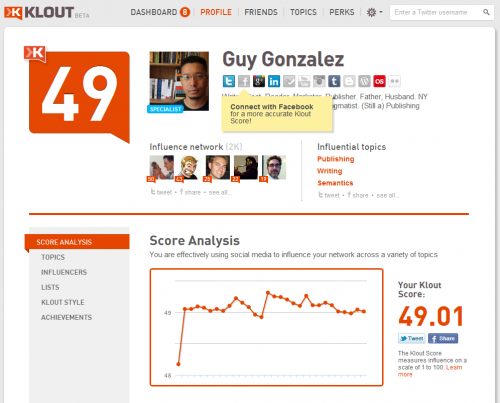Getting people to click on a link is an accurate measure of getting people to click on a link not of actual influence which is much harder to define and track.
For some people, the NY Times is hugely influential while for others FOX News is their go-to source, and what and how either reports (or ignores) the news of the day can have a huge impact on how it’s perceived and what happens next. Meanwhile, Lady Gaga, Justin Bieber, et al may sell a ton of records and other products, but their real influence over anything worthwhile is relatively narrow, short-lived, and certainly not on par with the NYT or FOX.
Putting the four of them on a linear scale of influence is silly, but that’s effectively what Klout does with its Klout Score, and based on that scale, Justin Bieber is more influential than President Obama!
Because I make a habit of testing as many new platforms and tools as I can so I can judge them firsthand, I’ve been “using” Klout for a while now, initially via Hootsuite, where it’s included in user profiles and often makes me chuckle at its overly loose definition of influence. More recently, I claimed my own account and added a few other networks to see how it might affect my score, including Google+ and LinkedIn, but purposefully excluded Facebook even though Klout prominently insists that I add it “for a more accurate Klout score!”
While my score did go up by several points within a few days after adding the additional networks, it seemed to fluctuate primarily based on the ebb and flow of my activity on Twitter, peaking at a ridiculously high 63 sometime last week, before their new algorithm tweak dropped it to what I consider a still ridiculously high 49. Interestingly, their graph (see picture) doesn’t reflect that tweak, instead resetting my scoring trend over the past month to reflect the new algorithm.
“POOF!”
These are not the metrics you’re looking for…
Therein lies the real problem with Klout. While its Topics feature is an intriguing attempt to add a much-needed contextual layer to its linear scoring and might have some long-term potential (most likely as acquisition bait, perhaps to complement PostRank or Radian6?), overall, it’s a pretty useless, Foursquare-style gamification of the worst aspects of Social MEdia.
In the short-term, though, it should in no way be considered a legitimate analytics tool. Sadly, there are apparently plenty of suckers people who believe it is and found themselves blindsided by the algorithm change, as noted by Bob LeDrew in a great guest post at Danny Brown’s blog:
So I checked with a couple of people I know and trust. Surely, I asked, businesses aren’t seriously considering Klout scores when choosing consultants or working on a measurement strategy for a communications initiative?
And my trusted friends told me that while they felt it ridiculous, businesses were using Klout numbers as part of the decision-making process on who is most influential and that there are instances where brands or agencies won’t work with people who are Klout-challenged.
I responded to this with a bad humored string of profanities that would have embarrassed my mother and impressed my father, if they were in earshot.
The biggest problem, of course, is that you simply *can’t* measure influence, at least not on a linear scale, and not even on a topical level. There are too many variables, too many channels, and way too much nuance involved, and the Beiber/Obama nonsense is just one example of many.
Another example is their list of “the top influencers for Publishing in the past 90 days,” all respectable brands and individuals — including two personal friends and one brand I used to run — but rather laughable for its exclusion of, say, Markus Dohle, Jeff Bezos, J.K. Rowling, or hell, even Joe Konrath!
There is no easy button.
The post The Problem With Klout? It Has None appeared first on Guy LeCharles Gonzalez.
